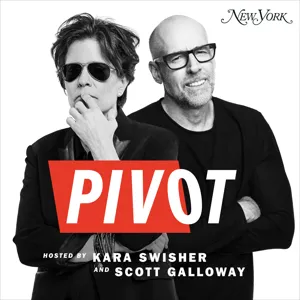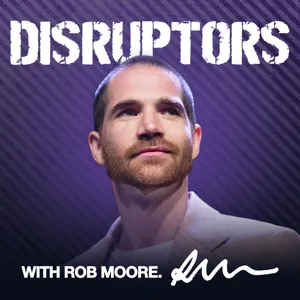Podcast Summary
Impact of Remote Work on Commercial Real Estate and Society: The pandemic has accelerated remote work trends, leading to potential changes in commercial real estate and societal norms. Employers may adopt a hybrid model, but the long-term viability of remote work remains uncertain.
The pandemic has brought about a significant shift towards remote work, which is likely here to stay in some capacity. This trend has major implications for the commercial real estate market and societal norms around communication and socialization in the workplace. However, not all employers may find remote work ideal, and the long-term viability of remote work arrangements remains uncertain. Startups, looking for a more efficient banking solution, can turn to Mercury for streamlined banking and credit card services, allowing them to focus on their business without compromising security. As for the future of work, it seems we're moving towards a hybrid model, but the ultimate impact on employees and employers remains to be seen.
Impact of Remote Work on Office Space Demand: Remote work could lead to a 40% decrease in office space demand, impacting urban communities and businesses.
The shift to remote work and hybrid work models is having a significant impact on the demand for office space. Employers are hesitant to bring employees back to the office full-time due to a lack of clear reason and fear of irritating employees. The trend towards remote work could result in a net destruction of up to 40% of demand for office space if employees only come in a few days a week. Offices were never fully occupied pre-pandemic, and commercial real estate has held up surprisingly well so far. However, the decrease in office occupancy could have ripple effects on urban communities, including fewer people eating in restaurants and fewer opportunities for random encounters at work, which could have societal impacts. While some CFOs may be in favor of permanent remote work for cost savings, few employers are making that shift. The future of office space remains uncertain, and the societal implications of less office occupancy are worth considering.
Remote work limits communication networks and weakens professional relationships: Remote work can hinder career growth due to fewer face-to-face interactions, affecting relationship building and learning opportunities, and may result in a selection issue where ambitious employees return to the office.
Working remotely can limit communication networks and weaken connections to colleagues, potentially impacting career growth. Pre-pandemic, employees had more face-to-face interactions, leading to stronger relationships and opportunities for learning. Neuroscience research suggests that in-person communication is different from virtual communication, affecting our ability to build and maintain professional relationships. Remote workers may miss out on informal interactions and the visibility that comes from being in the office, making it harder for them to advance. This creates a selection issue, as ambitious employees may be more likely to return to the office, leaving remote workers at a disadvantage. Employers may need to invest more resources in supporting remote workers to ensure they stay informed and connected.
Maintaining Employee Satisfaction with Flexibility: Employers should offer flexibility to accommodate employee needs, such as remote work or flexible schedules, to boost satisfaction and productivity. Gradual office returns and accommodations for caregivers are examples of flexible arrangements.
Employers should consider why employees enjoyed working remotely and offer more flexibility when possible to maintain employee satisfaction. Companies like Comcast are bringing employees back to the office but are doing so gradually, recognizing the benefits of remote work for employees. Flexible schedules and the ability to work from home when sick are examples of how employers can accommodate their employees' needs without disrupting internal operations. Additionally, there may be a new classification of workers, such as caregivers, who could benefit from flexible work arrangements. Employers should consider these options to attract and retain talent while maintaining productivity. Ultimately, the goal is to find a balance between the needs of the employer and the needs of the employee.
Exploring the Benefits of Remote Work for Society: Remote work can benefit society by offering opportunities for an aging workforce and those with caregiving responsibilities, but it may not completely solve longer commutes for some.
Remote work has the potential to benefit society, but it may not completely solve current issues such as longer commuting for some people. However, it can offer solutions for other problems, like providing opportunities for an aging workforce to continue working part-time or in a more flexible manner. Remote work has proven to be more effective than expected, making it a viable option for employees with caregiving responsibilities or those nearing retirement. Employers should consider offering more flexible work arrangements, but it remains to be seen if this trend is being widely adopted. Peter Capelli, a professor at the Wharton School and author of "The Future of the Office," advocates for these arrangements, as they can benefit both employees and employers. While there are challenges, the potential benefits of remote work make it a worthwhile consideration for the future of work.
Seeking in-office experience in a fully remote world: Explore opportunities with your manager, consider other jobs, or find a balance between remote and in-office work for career growth.
For professionals seeking career growth and development, having some in-office experience is valuable. However, with the shift to remote work due to the pandemic, some individuals may feel stuck if their company is fully remote and they yearn for the office environment. In such situations, it's essential to consider the specific circumstances and communicate openly with your manager about potential opportunities to work in the office. If those opportunities don't exist, then it might be worth exploring other job opportunities that align with your career goals and provide the desired in-office experience. Ultimately, finding a balance between remote and in-office work may be the key to career success in today's evolving work landscape. Regarding the Mint Mobile offer discussed earlier, it's an excellent deal for those looking to save on their wireless bills. With high-speed 5G data, unlimited talk and text, and the ability to use your own phone, Mint Mobile offers a flexible and affordable wireless solution. The family plan is also an attractive option, starting at just two lines. So, if you're looking to cut your wireless bill, consider checking out Mint Mobile at mintmobile.com/propg.
Communicating job intentions with your employer: Be open with your employer about job offers, but do market checks to ensure best deal. Decline in office real estate values due to remote work, but converting to residential may not be economically viable.
When considering a job offer, it can be beneficial to communicate openly with your current employer about your intentions. This transparency may motivate them to create opportunities for you to stay, as great jobs and companies are valuable assets that are not easily replaced. On the other hand, it's essential to do a market check and explore other offers to ensure you're getting the best possible deal. Regarding real estate, the shift to remote work has led to a significant decline in the value of commercial office spaces. However, converting all of this vacant office space into apartments may not be economically viable due to the large, open floor plans and the high level of debt associated with these assets. The decline in office real estate values represents a significant loss for investors, but it's important to consider the potential tax revenue implications and logistical challenges of converting these spaces into residential units.
Office Buildings Face Decades of Challenges: Despite some repurposing, office buildings face significant challenges and uncertain future, with potential for prolonged vacancies, price cuts, or demolition.
The commercial real estate market, particularly office buildings, is facing significant challenges and may not fully recover for decades. While some buildings may be converted to residential or other uses, the majority may lie empty, be torn down, or see significant price cuts. This is due to a number of factors, including the high cost of conversion and the fact that most office buildings are not well-suited for apartment conversions. Between 2016 and 2021, only a small number of office spaces were converted to other uses, and the cost to convert offices to apartment buildings can be high. Commercial real estate owners have been in denial about the situation, but it's clear that the asset class has taken a major hit and will continue to do so for some time. The numbers we've discussed are just a fraction of the total, and the future of commercial real estate is uncertain. Some properties will be repurposed, but most will face significant challenges. This is a trend that could take 10 or 20 years to play out, and it's important for investors and property owners to be aware of the risks.





